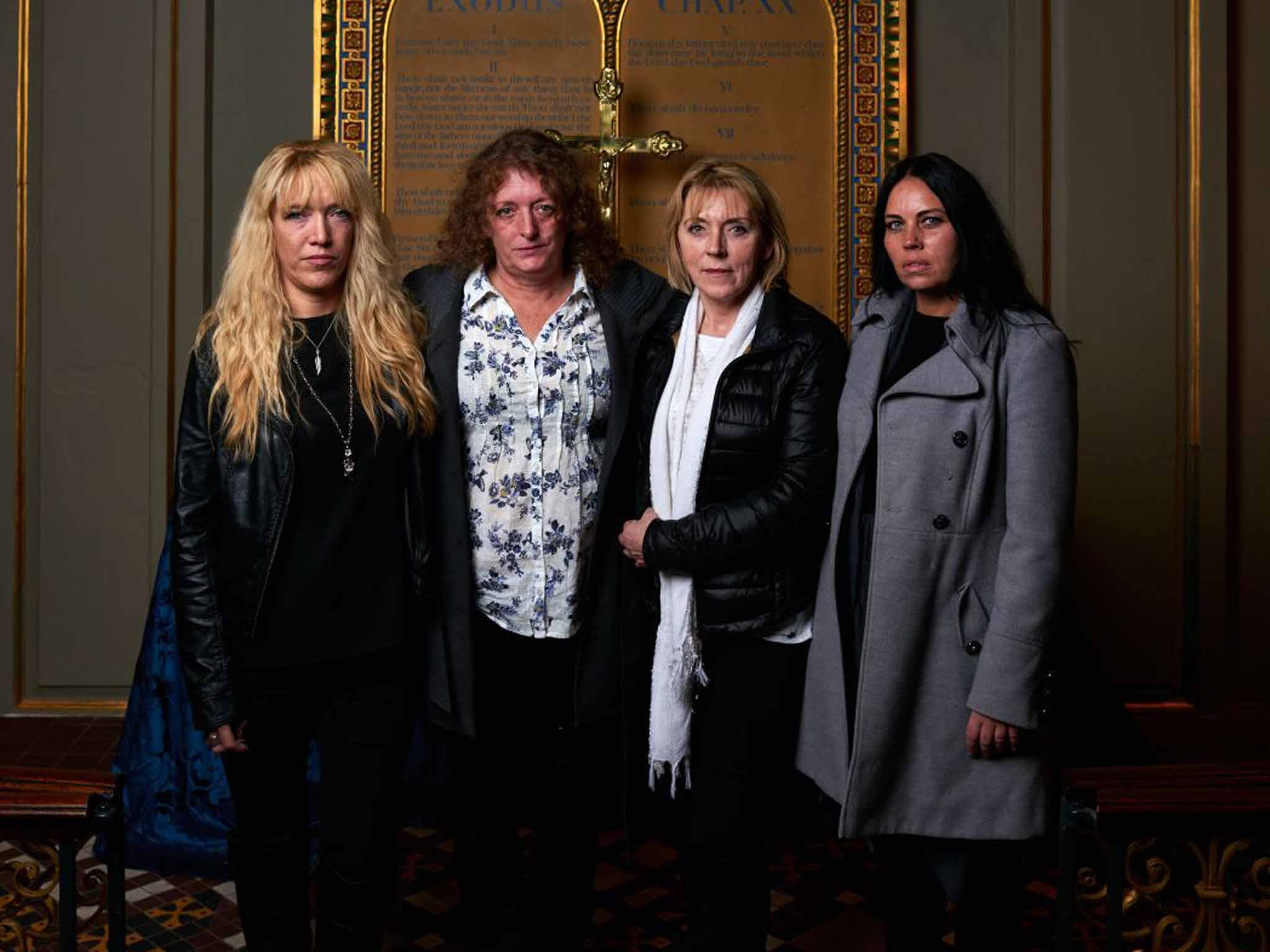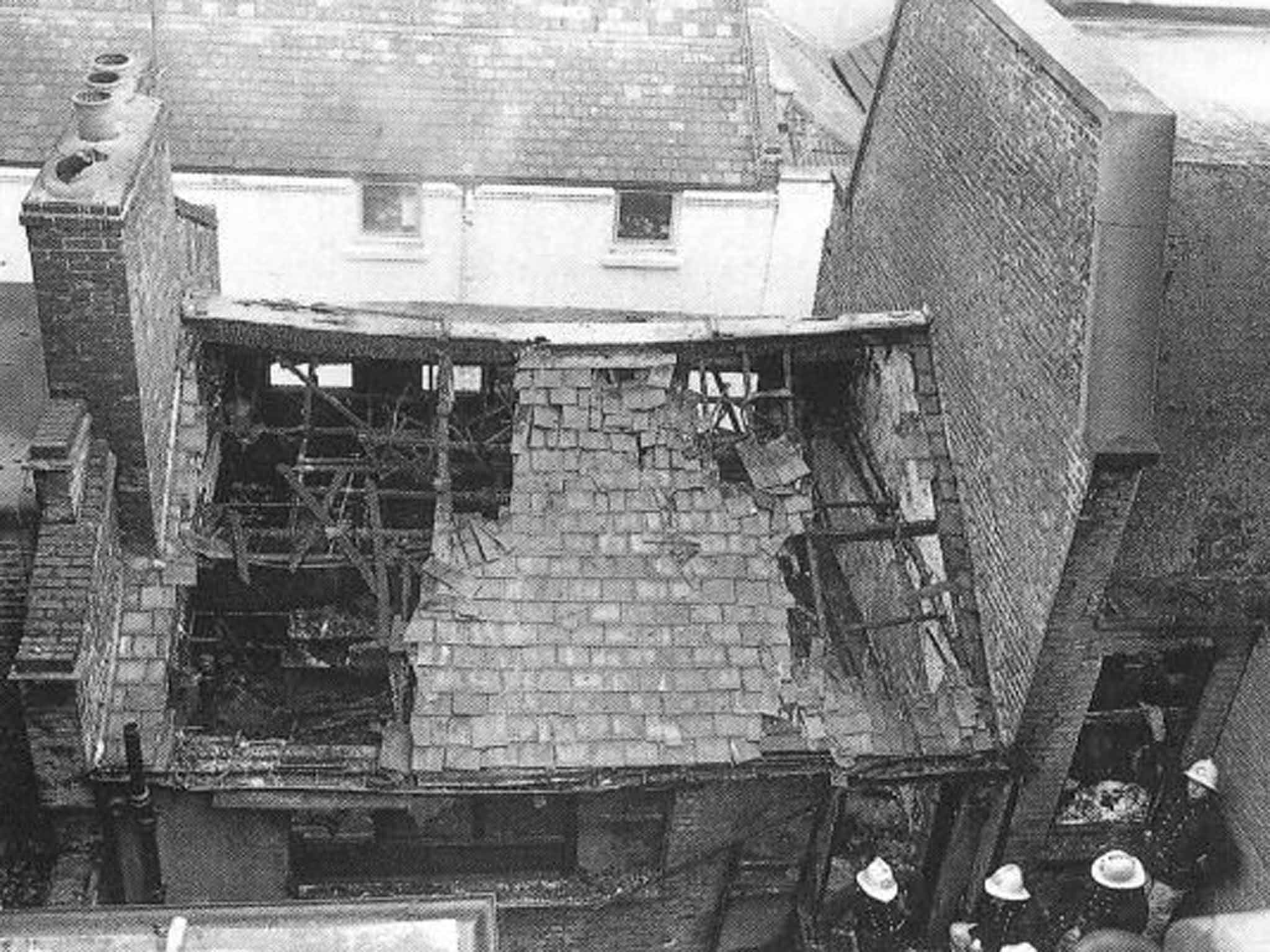Denmark Place fire: The first formal commemoration of the 37 people who died 35 years ago
After Simon Usborne investigated an historic arson attack in London – which killed 37 people – the bereaved began to find answers to a crime that had largely been ignored

As fog gripped the spire of St Giles-in-the-Fields on Sunday night, four women sat inside for a service to commemorate the dead.
They had waited a long time.
Just yards away, in an alley on the other side of Denmark Street in central London, members of their families were among 37 people who died in a forgotten fire and one of the worst mass murders in British history.
The Denmark Place arson attack of 1980 claimed more lives than the disaster at Kings Cross seven years later – and any other fire in London since the war.
When I told the story of the fire last August, 35 years after it had torn through two nightclubs and three dozen families, many readers were shocked that they had never heard of it and that there had never been a plaque or memorial.
The arsonist poured petrol through the letterbox of the building after a row with a barman over the price of a drink – and lit a match.
Fire engulfed the unlicensed clubs on the floors above in seconds, killing many where they stood. In the reports that followed, victims were described as “folk intent on slumming” – and worse. Until this year their names had not been published and no newspaper had spoken to their families.
Finding any family members had taken months and many remained elusive. I was particularly keen to talk to Nicola Reid, who had been five when her father, Alexander Reid, died in the fire. Alex was a friend of Paddy Crossin, a Londoner who had decided to go home early on the night of the attack.
She showed me around the area for my story and shared her anger about the way victims had been maligned and forgotten.
On Sunday, Nicola was on the front row in the church for the All Souls service for lost relatives. She and the church's rector, Alan Carr, were among dozens of people who contacted me after the article was published. When I relayed Carr's intention to mention the fire in the service to the growing group of families I had contact with, many wanted to come to St Giles.
“I haven't got many memories of my dad but I feel closer to him tonight,” Nicola, now 39, said after the service alongside her aunt Janette, Alex's sister. “The fire's had a big impact on my family.” Nicola's mother and sisters all struggled to keep their lives on track. “My wee brother did, too,” she says, “and that's what I remember – him always asking about my dad. But my mum never really spoke about it. I don't think anybody wanted to speak about it.”
The Reids had travelled to the church from their homes outside Glasgow. They sat next to Paddy as well as Lorna and Yvonne Dick, whose sister, Maria Dick, died in the fire days after her 22nd birthday. By coincidence they live just a few miles away from the Reids.
After Carr read out the first names of all the victims, the women lit candles while a choir performed Fauré's Requiem.

Nicola had spent years trying to find out about the fire, which only now has a Wikipedia page. Like many families of victims, she had periodically trawled the internet. A brief post at the Londonist website in 2012, and my story this year, have answered some of their questions. They have also triggered new conversations about the fire in families which had, as Nicola puts it, “swept it under the carpet”.
Janette was 22 in 1980, and recalled having to collect Alex's car from Denmark Street days after the fire. “His jacket was still in it,” she said. She later learned that he had been at a window escaping when a woman called for help and he went back inside. On Sunday, she told Nicola that this sounded just like something her father would have done.
Most of the messages I received after the article came from families, but I also got an email from a man called Michael O'Brien. John Thompson, a crook from East London, received a life sentence for the Denmark Place fire in 1981. He later shared a prison wing with O'Brien. “I did not know the full story of what he did, and seeing your article has shocked me to the core,” he wrote in an email, describing how Thompson had abused younger inmates. “He was an evil man who showed no remorse. It also brought back memories, seeing his name in your paper, about what he tried to do to me.”
O'Brien was in prison for the 1987 murder of a Cardiff newsagent. In 1998, he and two other men were released, before the Court of Appeal quashed their convictions the next year. O'Brien later received £300,000 in compensation and now writes and speaks about miscarriages of justice. Thompson remained in prison until 2008, when he died of cancer while handcuffed to a hospital bed.
Ryan Dolan, was five when his father Peter died in the fire, emailed me after discovering the article. He said he felt “daft... a grown man sitting shaking, with tears in my eyes like a five-year-old boy.” He had not known about Thompson's death, which was not reported at the time. “I am weirdly grateful for the news – stops me having that endless conversation with him in my head each year,” he added.
Thirteen victims had been salsa dancing in a Colombian club. They were dismissed in early reports as illegal immigrants, as if they merited less care. Alex Reinhard, who was 10 months old when his Colombian father Plutarco died in the fire, dismissed that notion. His father was a young graduate from Bogota who had worked legally in London hotels. “They said he was a very good dancer,” Reinhard told me.
In an email afterwards, Leila Birnie remembered Peter, the Venezuelan boyfriend of her friend Katerina. He survived the fire with serious injuries. “He was not a low-life; neither were his pals,” Birnie told me. “They worked and saved. He had his own restaurant briefly in Soho.” Birnie now lives in Las Vegas and said she thought Peter would still be too traumatised to talk about the fire.
On Sunday night, the women whose lives had been changed in a flash had a glass of wine outside the church in the dark. The service had been painful at times, but they also described it as beautiful.
Now reunited in delayed memorial, they plan to gather again in a few years when the developers of the area, which is being transformed, honour their promise to unveil a plaque on the site of the fire.
“It's difficult, but we're just happy that they're getting acknowledged,” Yvonne Dick said. “There were 37 families ripped apart and nobody said anything about it, but thankfully the information's there now, and now this has happened.” The sisters and the Reids then made their way back to Scotland. It was the first time Nicola had spent time away from her three young children and she was anxious to see them again. The youngest, aged seven, is called Alex. “I always wanted to name one of my kids after my dad,” she said.
Bookmark popover
Removed from bookmarks